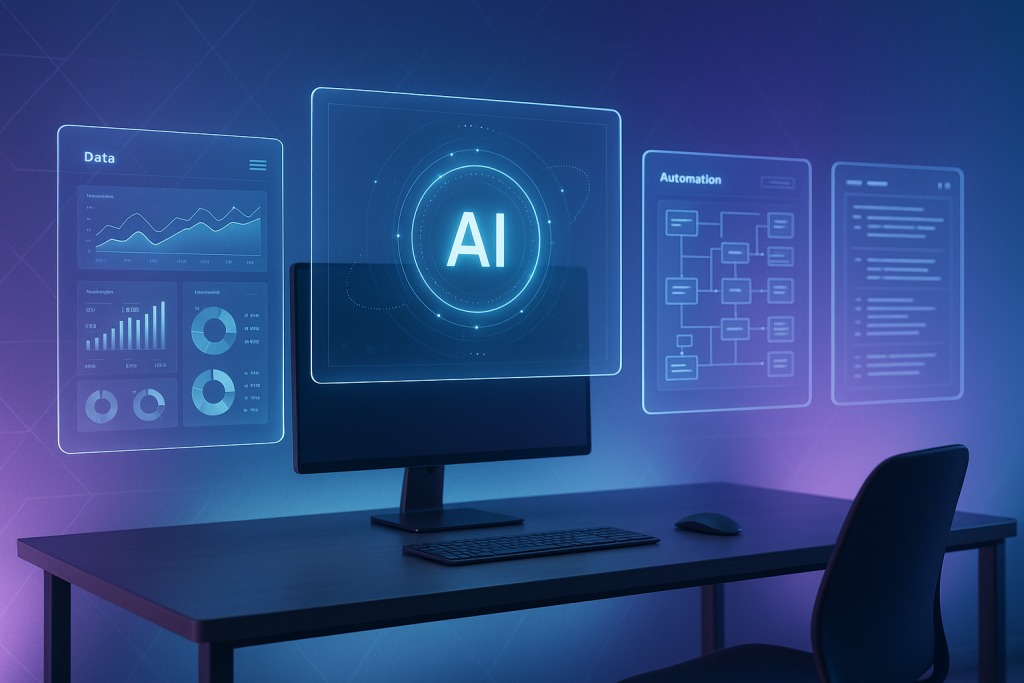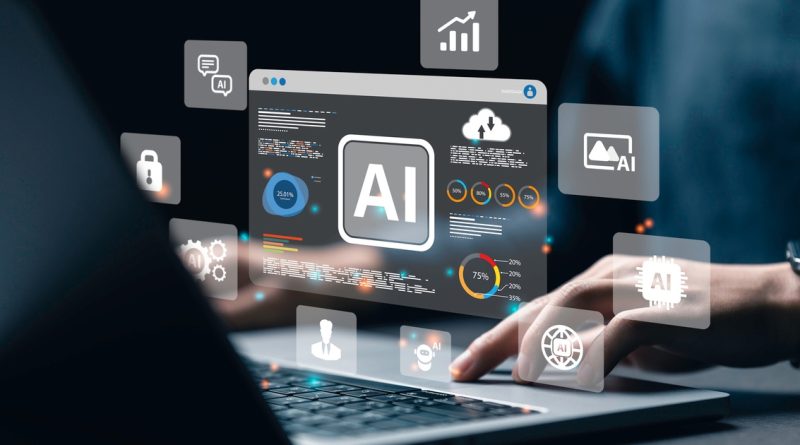AI-Powered Software Tools Transforming Businesses
Artificial Intelligence (AI) is no longer a futuristic concept it is today’s reality. In 2025, businesses across industries are leveraging AI-powered software tools to enhance efficiency, reduce costs, improve customer experiences, and unlock new opportunities for growth. From predictive analytics to automated workflows, AI has become a game-changer in the digital transformation journey.This article provides a comprehensive look at how AI-powered software tools are transforming businesses, their benefits, real-world applications, challenges, and what the future holds.
The Rise of AI in Business
In the past decade, the adoption of AI has skyrocketed due to advancements in machine learning, natural language processing (NLP), computer vision, and generative AI. Businesses that once relied on manual processes and traditional software now integrate AI to make smarter decisions, optimize operations, and deliver personalized customer experiences.
According to industry analysts, the global AI market is expected to surpass $1 trillion by 2030, and AI-powered software tools are at the forefront of this growth.
Types of AI-Powered Software Tools
1. AI in Customer Service
-
Chatbots and Virtual Assistants: Tools like AI-driven chatbots can handle 24/7 inquiries, reduce response times, and improve customer satisfaction.
-
Sentiment Analysis Tools: AI can analyze customer feedback and detect emotions in real-time.
2. AI in Marketing and Sales
-
Predictive Analytics: Helps businesses forecast demand, customer behavior, and sales trends.
-
AI-Powered CRMs: Platforms like HubSpot and Salesforce integrate AI for lead scoring and personalized recommendations.
3. AI in Human Resources
-
Recruitment Tools: AI-based platforms screen resumes, conduct video interview analysis, and shortlist candidates.
-
Employee Engagement: AI monitors employee performance, suggests training, and enhances workplace satisfaction.
4. AI in Finance and Accounting
-
Fraud Detection Software: AI identifies unusual patterns and prevents financial fraud.
-
Automated Accounting Tools: AI automates invoice processing, payroll, and tax filing.
5. AI in Supply Chain Management
-
Demand Forecasting: Predicts product demand to optimize inventory.
-
Route Optimization: AI reduces delivery times and transportation costs.
6. AI in Cybersecurity
-
Threat Detection Systems: AI identifies potential cyberattacks faster than traditional methods.
-
Automated Risk Management: Tools assess vulnerabilities and suggest preventive measures.
7. AI in Content Creation
-
Generative AI Tools: Create blog posts, social media content, and product descriptions.
-
Video & Image Editing Tools: AI enhances media creation and speeds up creative processes.
Benefits of AI-Powered Software Tools
-
Increased Efficiency – Automates repetitive tasks, saving time and resources.
-
Data-Driven Decisions – AI analyzes big data to provide actionable insights.
-
Enhanced Customer Experience – Personalized services increase customer loyalty.
-
Cost Savings – Reduces operational costs by automating workflows.
-
Scalability – Businesses can grow without a proportional increase in workforce.
-
Competitive Advantage – Early AI adopters gain a strategic edge over competitors.
Real-World Applications of AI in Business
Retail
-
Personalized product recommendations
-
Automated checkout systems
-
AI-driven demand forecasting
Healthcare
-
AI diagnostic tools
-
Drug discovery platforms
-
Patient engagement chatbots
Manufacturing
-
Predictive maintenance of machinery
-
AI-driven robotics in assembly lines
-
Supply chain optimization
Education
-
Personalized learning experiences
-
AI grading and assessment tools
-
Virtual teaching assistants
Hospitality
-
AI-powered booking assistants
-
Personalized guest recommendations
-
Dynamic pricing systems

Challenges of Using AI in Business
-
High Implementation Costs – Advanced AI tools may require significant upfront investment.
-
Data Privacy Concerns – AI relies on large datasets, raising issues of security and compliance.
-
Skill Gaps – Businesses need trained professionals to manage AI systems.
-
Overdependence on Automation – May reduce human creativity and critical thinking.
-
Bias in AI Systems – Poorly trained AI can make unfair or inaccurate decisions.
How AI is Transforming Different Business Functions
Marketing
AI-powered marketing tools enable hyper-personalization by targeting customers with tailored campaigns. Marketers can now predict customer journeys and optimize ad spending.
Sales
AI-driven CRMs track buyer intent, score leads, and provide real-time recommendations, making sales teams more effective.
HR
Recruitment is faster and more unbiased, employee turnover can be predicted, and engagement can be monitored through AI surveys.
Finance
AI reduces fraud, ensures compliance, and accelerates accounting processes. Companies save millions annually by avoiding fraud and inefficiencies.
Operations
AI optimizes logistics, manages supply chains, and predicts market trends, allowing businesses to remain agile.
The Future of AI-Powered Software Tools
-
Generative AI Expansion – More businesses will adopt AI to create marketing campaigns, product designs, and customer engagement strategies.
-
AI and IoT Integration – Smart devices will be more interconnected, leading to autonomous decision-making.
-
AI-Driven Sustainability – Businesses will use AI for green initiatives like energy optimization and waste reduction.
-
Voice and Emotion AI – Tools that understand tone and emotion will make customer service more natural.
-
Decentralized AI Systems – AI will move closer to the edge, reducing reliance on cloud-only solutions.
Case Studies
1: Retail Giant Boosts Sales
A global retailer integrated AI into its recommendation system, leading to a 30% increase in online sales.
2: AI in Healthcare
Hospitals using AI diagnostic tools reduced misdiagnosis rates by 25% and improved patient care efficiency.
3: AI in Finance
A major bank implemented AI fraud detection systems and reduced fraudulent transactions by 40%.
Best Practices for Businesses Adopting AI
-
Start with small AI projects before scaling.
-
Invest in employee training for AI literacy.
-
Ensure compliance with data privacy regulations.
-
Regularly update AI models for accuracy.
-
Balance automation with human oversight.
Conclusion
AI-powered software tools are no longer optional—they are essential for modern business survival. By automating tasks, improving decision-making, enhancing customer experience, and driving innovation, AI is reshaping industries worldwide.
While challenges such as cost, privacy, and ethics exist, the opportunities far outweigh the risks. Businesses that embrace AI today will be the leaders of tomorrow.
The future is clear: AI-powered software tools are transforming businesses, and the revolution has only just begun.
Frequently Asked Questions (FAQ)
Q1: What are AI-powered software tools?
AI-powered software tools are applications that use artificial intelligence technologies like machine learning, natural language processing, and computer vision to automate tasks, analyze data, and improve business decision-making.
Q2: How can AI tools benefit small businesses?
Small businesses can use AI tools for automating repetitive tasks (like scheduling or invoicing), improving customer support with chatbots, enhancing marketing campaigns through predictive analytics, and making smarter financial decisions.
Q3: Are AI-powered tools expensive to implement?
Not necessarily. Many AI tools are available as cloud-based Software as a Service (SaaS), offering affordable subscription models. This allows even startups and small businesses to access advanced AI capabilities without heavy upfront investment.
Q4: Can AI tools replace human employees?
AI tools are designed to assist rather than completely replace humans. They excel at repetitive, data-driven tasks, while human creativity, emotional intelligence, and strategic thinking remain essential.
Q5: What industries benefit most from AI-powered tools?
Almost every industry can benefit, but some key sectors include healthcare (diagnostics and patient care), finance (fraud detection, investment strategies), retail (personalized shopping), marketing, and manufacturing (process automation).
Q6: Is data security a concern with AI tools?
Yes, businesses must ensure that AI tools comply with data protection regulations. Choosing reliable vendors and implementing cybersecurity best practices is essential when integrating AI solutions.
Q7: How do AI tools improve customer experience?
AI tools analyze customer behavior to provide personalized recommendations, offer 24/7 support through chatbots, and predict customer needs, creating a more seamless and engaging experience.
Q8: What is the future of AI in business?
The future of AI in business lies in hyper-automation, predictive analytics, and deeper personalization. As AI continues to evolve, it will play an even bigger role in decision-making, innovation, and business growth.




